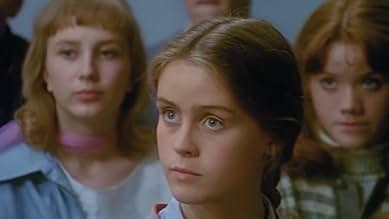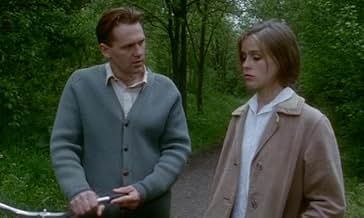IMDb RATING
6.9/10
1.3K
YOUR RATING
The Other Side of Sunday criticizes the small, and often tight church community. We follow the Preachers Daughter; Maria, in her journey to liberate herself from the stiff church community a... Read allThe Other Side of Sunday criticizes the small, and often tight church community. We follow the Preachers Daughter; Maria, in her journey to liberate herself from the stiff church community and her strict religious father.The Other Side of Sunday criticizes the small, and often tight church community. We follow the Preachers Daughter; Maria, in her journey to liberate herself from the stiff church community and her strict religious father.
- Nominated for 1 Oscar
- 9 wins & 7 nominations total
Petter Width Kristiansen
- Pål Helge
- (as Petter With Kristiansen)
Featured reviews
I'd not heard of this film before it appeared on our TV and, going by the extent of feedback to IMDB, it has not been widely seen or appreciated.
The storyline is simple. It concerns a teenage girl growing up in late 1950s Norway, in a strict religious household, with her father the local pastor. She begins to realise that there is more in the world than strict orthodox Christianity. This leads to increasing tensions and her gradual rebellion.
The film is warm and human, and there is enough wit and humour to prevent it becoming tedious, dry, or just another "teenage rebellion" movie. Having had a relatively similar upbringing, I found a great deal of honesty in this film.
The photography, acting, late 1950s musical background and overall quality are excellent, with possibly a nod of recognition to Bergman. As I said in my one-line summary, this film really does deserve more recognition.
The storyline is simple. It concerns a teenage girl growing up in late 1950s Norway, in a strict religious household, with her father the local pastor. She begins to realise that there is more in the world than strict orthodox Christianity. This leads to increasing tensions and her gradual rebellion.
The film is warm and human, and there is enough wit and humour to prevent it becoming tedious, dry, or just another "teenage rebellion" movie. Having had a relatively similar upbringing, I found a great deal of honesty in this film.
The photography, acting, late 1950s musical background and overall quality are excellent, with possibly a nod of recognition to Bergman. As I said in my one-line summary, this film really does deserve more recognition.
10pdee-1
I consider this movie to be outstanding - well worth a 10. It is a totally Norwegian production and therefore doesn't suffer the defects of the Scandinavian co-productions with characters confusingly and variously speaking in Swedish,Danish and Norwegian. The plot is straightforward and the cinematography is excellent. The acting is first class and as a Norwegian Broadcasting Corporation production is up there with the best that the BBC can produce. I am surprised that Marie Theisen has seemingly dropped out of films after a second film which I have been unable to obtain. The present film received a well deserved Oscar nomination. Ms.Theisen now appears to be a film reviewer for Kanal 24 in Norway. Such a pity that she is out of the production side.
10pampeano
"Søndagsengler" is a norwegian movie that have all genres: comedy,drama,religion,but about all:love.It's a pity that this movie not won the Oscar,because is most to deserved,in my case,that Kolya.The Academy Awards Jury not choose movies that,really,deserved it.Well,this movie is so sensitive,like all norwegian and scandinavian movie,and entertaining,with beautiful sequences,marvelous screenplay and excellent performances. But,I follow thinking that this movie deserved the Oscar. Now,"The Other Side of Sunday" is one of my favourites films and one of the best of all times. My opinion:You must see this movie.
Enough to put you off organised religion for life, this one.
A Norwegian girl on the cusp of adulthood in the 50's decides she no longer wants to be a Christian. This dismays the local community including her father, who just so happens to be the town priest. But what is boring sermons and staid hymns compared to boys, rock 'n' roll and long, refreshing dips in the nearby stream? No contest, really.
It's impossible to not be on Maria's (our rebellious protagonist) side as her dad never listens, her mother always takes his side and her siblings are under their thumb as much as she is. There's certainly a good way to have faith, but it's not to be found here: where apparently laughing at someone farting at the dinner table or wearing earrings is considered a major sin.
Marie Theisen is fantastic in the main role, alternating between euphoria at her newfound freedom and determination at her family's attempt to quell her uncovered adventurous spirit. She also says 'dog darn' a lot to avoid blasphemy, which makes no sense but is highly amusing.
Probably not one for regular churchgoers, who might find it a 'slur' on their beliefs. But everyone else though, it's an impressive piece of work that might just make you think twice before blindly believing in the hereafter... 7/10
A Norwegian girl on the cusp of adulthood in the 50's decides she no longer wants to be a Christian. This dismays the local community including her father, who just so happens to be the town priest. But what is boring sermons and staid hymns compared to boys, rock 'n' roll and long, refreshing dips in the nearby stream? No contest, really.
It's impossible to not be on Maria's (our rebellious protagonist) side as her dad never listens, her mother always takes his side and her siblings are under their thumb as much as she is. There's certainly a good way to have faith, but it's not to be found here: where apparently laughing at someone farting at the dinner table or wearing earrings is considered a major sin.
Marie Theisen is fantastic in the main role, alternating between euphoria at her newfound freedom and determination at her family's attempt to quell her uncovered adventurous spirit. She also says 'dog darn' a lot to avoid blasphemy, which makes no sense but is highly amusing.
Probably not one for regular churchgoers, who might find it a 'slur' on their beliefs. But everyone else though, it's an impressive piece of work that might just make you think twice before blindly believing in the hereafter... 7/10
It is the late 1950s in a small village in Norway. Bjørn Sundquist plays Johannes, a priest in the Church of Norway. Johannes has a wife, a son, and two daughters. The story revolves around Johannes, his pretty older teenage daughter Marie (Marie Theisen), and his church organist and assistant Mrs. Tunheim. Oddly we never know the family name of Johannes' family--the only person with a last name is Mrs. Tunheim, and we never know her first name. Johannes is stern and unyielding in his behavior. In the pulpit he is seen promoting the usual Christian pieties; his congregation looks like they are attending a funeral rather than a service. The rule is to look straight forward during a service and the first hint we get of what is to come is Marie's pinching her sister during a service. Johannes is harsh with his family and a prominent theme is the ongoing battle of wills between him and Marie. However, in several scenes we see a human side of Johannes that somewhat soften the initial stereotypical image that we might have of him.
Marie struggles to understand her religion and her burgeoning sexuality. Even in the face of the rigidity of her father's religious positions (or because of them) Marie has questions. As one example of her questioning consider this conversation with Mrs. Tunheim:
Marie: Do you think God did a poor job when he created man?
Mrs.Tunheim: Why do you ask?
Marie: He created us so that we have to ask forgiveness all the time. Isn't that a poor creation?
Or this reflection: "Isn't it just some sort of invention to love and cherish until death do you part? I love meatballs, but I cannot promise God that I will do that for the rest of my life." The movie often mixes humor with its more serious considerations.
Music plays an essential role in the film, ranging from Bach to 50s pop ballads. Music contributes to some exquisitely beautiful scenes like the one where Marie swims naked in the river.
All the actors capably handle the subtle complexities demanded of them, but it is ultimately Marie Theisen who carries the film and raises it above the average. She perfectly captures the questioning innocence at the core of Marie's personality and the stubborn persistence to find her own way in an environment that is trying to impose conformity. Marie is not about to give up on God, she is just looking for her own God--a God of nature, a God of forgiveness, a God who likes us when we are happy. This movie can be seen as a kinder and gentler version of a Bergman film that treats the same themes.
Expect surprises on the way to a definitive final scene.
Marie struggles to understand her religion and her burgeoning sexuality. Even in the face of the rigidity of her father's religious positions (or because of them) Marie has questions. As one example of her questioning consider this conversation with Mrs. Tunheim:
Marie: Do you think God did a poor job when he created man?
Mrs.Tunheim: Why do you ask?
Marie: He created us so that we have to ask forgiveness all the time. Isn't that a poor creation?
Or this reflection: "Isn't it just some sort of invention to love and cherish until death do you part? I love meatballs, but I cannot promise God that I will do that for the rest of my life." The movie often mixes humor with its more serious considerations.
Music plays an essential role in the film, ranging from Bach to 50s pop ballads. Music contributes to some exquisitely beautiful scenes like the one where Marie swims naked in the river.
All the actors capably handle the subtle complexities demanded of them, but it is ultimately Marie Theisen who carries the film and raises it above the average. She perfectly captures the questioning innocence at the core of Marie's personality and the stubborn persistence to find her own way in an environment that is trying to impose conformity. Marie is not about to give up on God, she is just looking for her own God--a God of nature, a God of forgiveness, a God who likes us when we are happy. This movie can be seen as a kinder and gentler version of a Bergman film that treats the same themes.
Expect surprises on the way to a definitive final scene.
Did you know
- TriviaIn 1997, this movie was nominated for an Oscar in the category "best foreign language film". Marie Theisen, who was 15 years old during the filming, had the main role in it. In an interview, she said that she realized her full nude swimming scene was difficult to accept for the American audience, but she thought it was well done and absolutely necessary for the context.
- ConnectionsReferenced in Norsk film er ____!?: I FOKUS på Norske Oscar-nominasjoner (2022)
- SoundtracksLove letters in the sand
Performed by Pat Boone
- How long is The Other Side of Sunday?Powered by Alexa
Details
Box office
- Gross US & Canada
- $4,769
- Opening weekend US & Canada
- $2,621
- May 3, 1998
- Gross worldwide
- $4,769
Contribute to this page
Suggest an edit or add missing content























